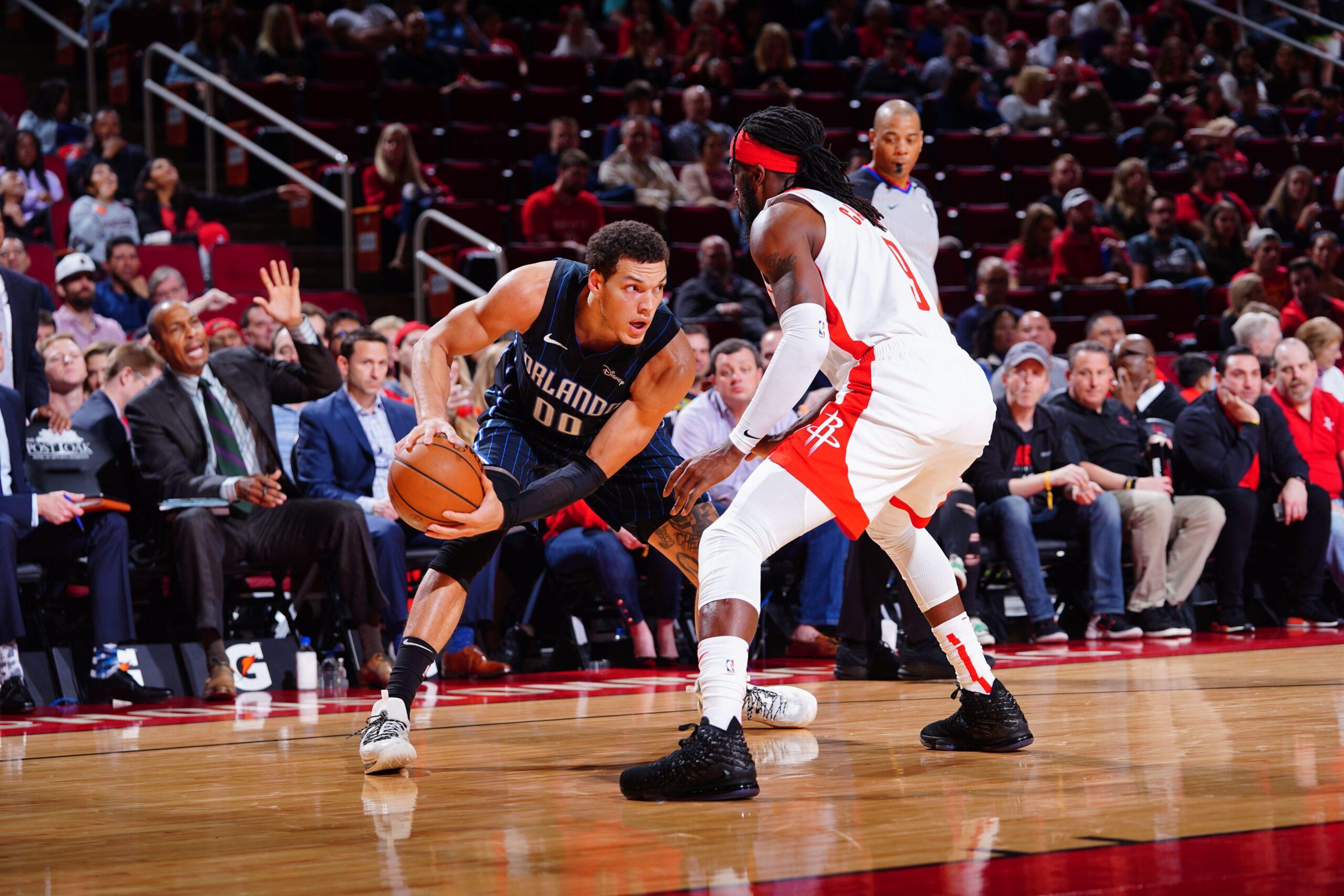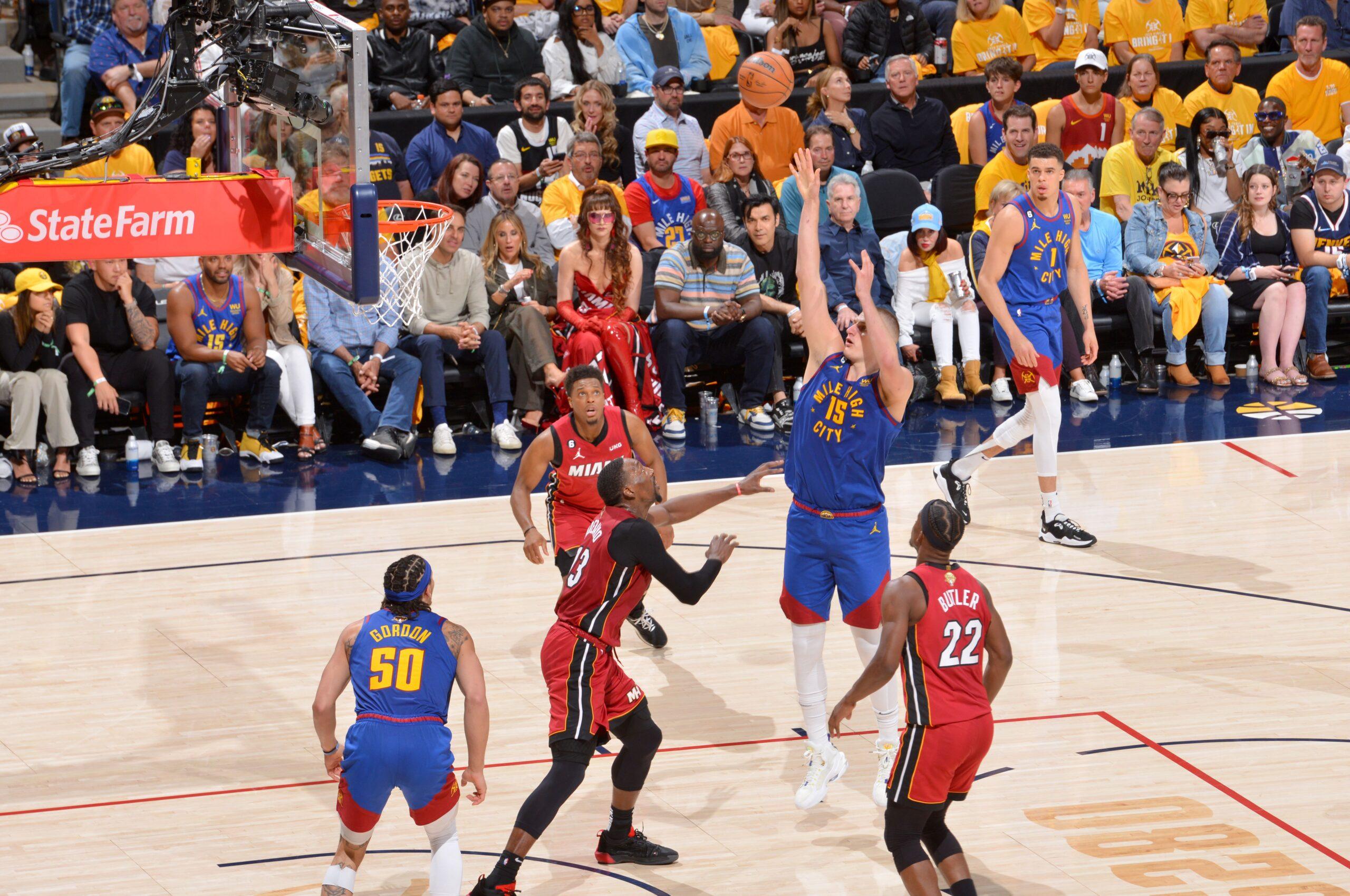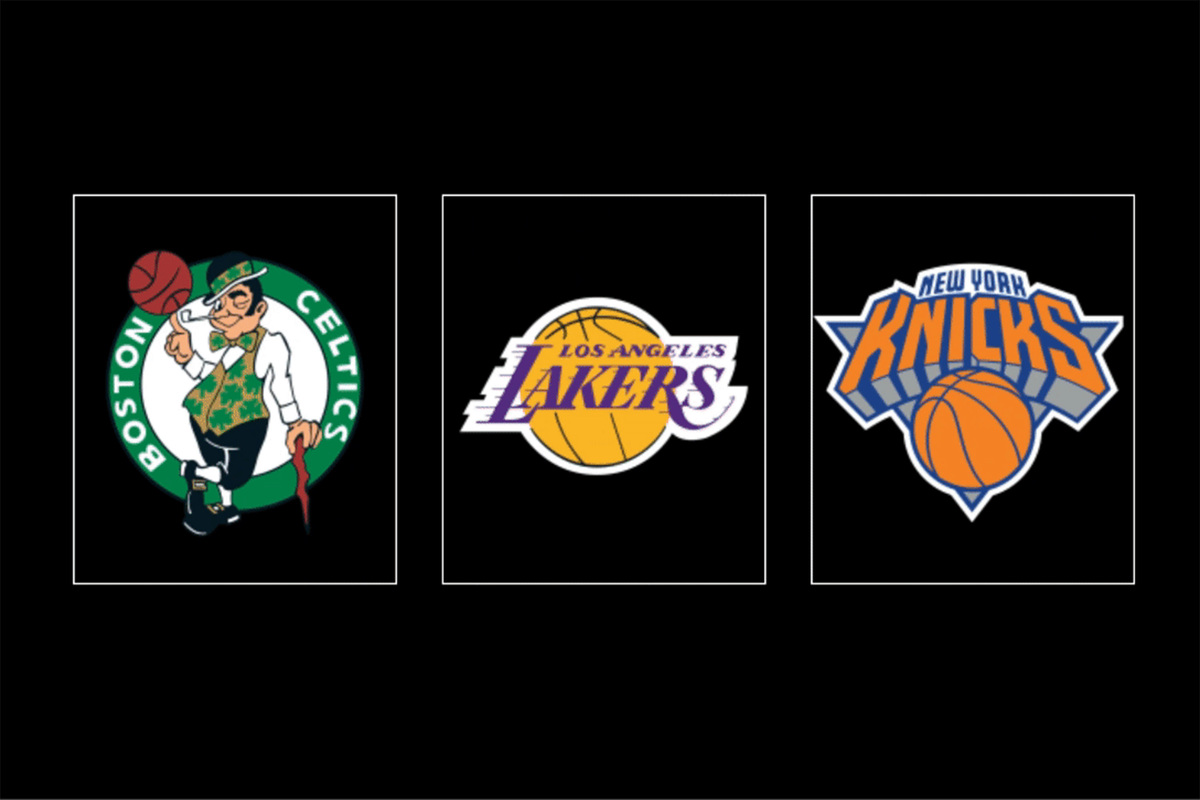As Anthony Edwards stood to exit the press conference stage, his eyes drifted down to the box score in front of him, and the full accounting of the Minnesota Timberwolves’ Game 4 loss to the Denver Nuggets. The reigning champions had just carried out a full-scale deconstruction of the best defense in the league. It was ruthless. Systematic. Denver had carved out quality shot after quality shot to make an even series out of near disaster. Yet even as Edwards began to walk away from it all, his neck craned back to the box score.
“Aaron Gordon,” he muttered, shaking his head. Even to one of the league’s most staggering talents, Gordon’s contribution seemed beyond belief. It wasn’t just the 27 points—more than any Timberwolf besides Edwards—but also the near-perfect shooting, the pressure of the occasion, the sheer range of it all. Teams like Minnesota pour so much into their efforts to slow down Nikola Jokic and Jamal Murray, and Gordon is often the player who punishes them for it. His best performances break teams. “Nikola’s gonna do what he does: 35, seven, and seven,” Nuggets head coach Michael Malone said postgame. “But what Aaron is doing in terms of the offense, the shotmaking, the playmaking, the physicality, the defense on two All-Stars—so much is being asked of him right now.” And in so many ways, Gordon is delivering.
It’s impossible to pin down Gordon’s exact responsibilities for these Nuggets. Most everything in Denver goes through Jokic. Murray largely plays to his strengths. Michael Porter Jr. and Kentavious Caldwell-Pope are who they are. But Gordon’s role toggles constantly between expansion and contraction—transcending the needs of a matchup to meet the needs of a moment. Sometimes what the Nuggets need is for Gordon to play to the edges of the offense. He does so brilliantly and without complaint. Other times, like in Game 4, what they needed most was to put the ball in Gordon’s hands, trusting the veteran forward to run point so Murray wouldn’t have to. Playoff basketball changes quickly, and Gordon helps the Nuggets keep up.
Such is the benefit of an overqualified, supercharged role player with the enduring capacity to do more. Gordon has spent his career expanding his game while narrowing his role—making him one of Denver’s most dynamic players, a well of potential energy just waiting to be tapped. It’s Gordon who allows the Nuggets to be lateral thinkers. He knows how to run every set in the playbook from every position. He has the ball skills to initiate the offense or simply keep it moving. The fact that he can take on the toughest defensive assignments—including Edwards—makes entire lineups viable.
“There are only two positions in basketball: on the floor and off the floor,” he says. “And I like being on the floor.”
Gordon clearly isn’t the Nuggets’ best player, but in a way, he’s the component that makes their team work. Denver wouldn’t have won the title last season if not for the discovery that it didn’t need to play a dedicated backup center because Gordon could do that job, too, on top of so many others. The latest version of that lineup faced a critical test in Game 4, when the Nuggets began the second quarter without Jokic on the floor, holding tight to a five-point lead.
What followed was a master class: three minutes of the artful, precise basketball that we’ve come to expect of Denver, only without the three-time MVP who typically makes it possible. This time, it was Gordon twirling through the lane and finding a teammate for a layup; power-posting his way inside and spraying out to a shooter for a 3; and taking the mismatch in front of him as an invitation to march all the way to the rim. By the time Jokic returned to the floor, Gordon and his teammates had added nine points to the lead. Denver went on to win by eight, 115-107, in a game that could swing the series.
“I don’t give a shit if I have zero points or a hundred points,” Gordon says. “It doesn’t matter, as long as we win, and I’m out there impacting the game and talking to my team and we’re cohesive.” His teammates will tell you that Gordon, in fact, is what makes the Nuggets cohesive. His complete absence of ego. The way he lifts people up and holds them accountable. His willingness to do less or take on more. Winning a championship effectively requires someone in this mold—a role player too skilled for their job, but not above it. “If we need him to score, he’ll score,” Porter says. “If we need him to pass, he’ll pass.” And then, after doing whatever is required, Gordon will let it all go.
So many NBA players cling to the comforts of routine, of knowing where and how their opportunities will come. Gordon is too adaptable to have that luxury, and frankly, doesn’t want it. Every time he takes the floor is a chance to give the Nuggets exactly what they need. He just has to punch in, get to work, and figure out what that might be.

As the clock wound down on a shambling crunch-time possession, Gordon could feel the pull. It was just his third game with the Nuggets after spending his first six-plus seasons on underwhelming Magic teams, most of which had turned to him in exactly these sorts of situations. Tight margin. Game in the balance. Now, Gordon found himself out on the wing, growing antsier by the second. He almost screened off the ball for Porter, but reconsidered. He started drifting into the corner, but stopped short, shuffling around aimlessly on the wing instead. His instincts grew louder.
“I’m like: I need the ball,” Gordon remembers. “I need the ball to win this game for us.”
But as he mulled about, looking for his place among his new teammates, something unfamiliar happened: Murray shook loose at the top of the floor, got a step on his defender, and rose up for an elbow fadeaway that dropped straight through the net, with no contribution from Gordon at all. “And I was like, ‘Oh. This is a little bit easier,’” Gordon says.
The Nuggets already had their closers. What they wanted from Gordon was everything else: the finishing, the defense, the playmaking. Everything that binds a team together. Denver traded for Gordon in March 2021 to address what general manager Calvin Booth recalls as a “gaping hole” at power forward following Jerami Grant’s departure in a sign-and-trade. When Gordon arrived, Malone and his staff urged the newest Nugget to play his game—to be himself. But who was he? Gordon had played for five different head coaches during his first six seasons in Orlando. He tried so many roles on for size that he was never quite sure what kind of player he was supposed to be.
“One coach would want it done this way, and then halfway through the season the coach would want it done another way,” Gordon says. “Then the next season, we’d have a new coach and then he would want it done another way. And I’m still trying to figure out how to even put the ball in the basket, let alone win.”
In those days, Gordon—a fourth overall pick with incomprehensible athletic gifts on a wayward team—was interested in exploring what all he could be. “Looking back, it’s only natural for him to try to push the limits and see what he can do—if he can be a franchise guy or whatever,” Booth says. “So I feel like at times, maybe even I misunderstood how he played there.” Consider it Gordon’s due diligence. He danced out on the perimeter where others might have preferred that he roll to the rim. He stretched his usage, at one point averaging 15 shots a game. That approach didn’t do much for the Magic, but it’s not as if he was siphoning off attempts from a high-functioning offense. Orlando was searching for a star, and Gordon was searching for himself.
“I think when you’re young, not just in sports, but just in general, you’re chasing something but you don’t know what it is,” says Nuggets assistant David Adelman, who also coached a 21-year-old Gordon as part of Frank Vogel’s staff in Orlando.
Frustrations mounted for Gordon, year over year, as much with his circumstances as himself. And in 2021, amid a wearying season for a Magic team going nowhere, he requested a trade. At that time, the league didn’t quite know what to make of Gordon—as evidenced by the fact that the Magic landed only Gary Harris, R.J. Hampton, and a single first-round pick from Denver in return for him and Gary Clark. Yet there were other options on the table that would have changed the course of Gordon’s career—and the contending fate of the Nuggets as we know them.
Every role he had ever tried was seemingly back on the table. The Magic discussed trading Gordon to the Rockets, who were on their way to their worst season in almost 40 years and would have offered Gordon every conceivable opportunity to put up points. “I didn’t want to be a 20-plus-point scorer on a bad team,” he says. “There’s a lot of guys that can do that in the league. I was close, and it would have kinda been that again.” Portland was a reported possibility, but of less interest to Gordon than two other winning clubs that could wind up meeting in this year’s Finals: Denver and Boston. “There were talks of me and Marcus Smart maybe being swapped,” Gordon says. “But it was either iso ball or team ball. And the team just kinda made more sense.”
The Nuggets, too, made more sense with Gordon. Jokic found an instant rapport with his new hard-cutting teammate, setting up Gordon for three dunks in their very first game together. Gordon’s work as a connector opened up the offense for Porter, and Porter’s shooting cleared the floor for Gordon—the beginning of a rich, symbiotic relationship between the two forwards. To this day, MPJ is Gordon’s most frequent assist target. The flexibility that Gordon brought to the Nuggets freed up Murray to attack in a wider variety of ways and spared him from tougher defensive matchups. A good lineup became a complete one—at least until Murray’s ACL tear put the vision of the team on hold. Yet even with Murray’s absence, Denver went 19-6 in its games with Gordon that first partial season.
If watching Murray ice a game was a clarifying moment for Gordon in his early days in Denver, so was watching Jokic work. During his time in Orlando, Gordon had often been late for workouts and treatments, and inconsistent in his preparations in general. “I needed to learn that,” Gordon says, “and I just wasn’t getting it.” A reality-bending natural athlete can get away with that for a time. But then he saw the way that Jokic stacked days, turning game readiness into a way of life. Gordon bought in—and he bought an entire warehouse on the east side of Denver to turn into his own personal gym. He installed a regulation half court with a baseline drawn in black-and-blue camouflage, all the better for a lurking dunker to disappear; a full weight room; recovery baths; and a sauna. There are two bedrooms, along with the legal permits for Gordon to literally live in the gym full time.
The other Nuggets now rave about Gordon’s habits in the way that he raves about Jokic’s or Caldwell-Pope’s. “He embodies everything that we’re about,” Reggie Jackson says. When they look at Gordon, they notice what he doesn’t do, or at least what he chooses not to: the restraint of a veteran who goes about his business, never makes a fuss, and sacrifices so many of the on-court vanities of NBA stardom. Gordon isn’t exactly a spot shooter by trade, but he made himself into a respectable threat from the corners to be even more of a factor in Denver’s spacing. Otherwise, he’s content to not shoot—scaling down his offense in deference to the scorers around him.
That’s why Joker and I have such a good connection. We both see the game. He sees it like three steps ahead, and I see it like two steps ahead.Aaron Gordon
“You see Jamal use the pick-and-roll, and you’re like: Ah, OK, you’re pretty fucking good at this,” Gordon says. “Or you see Joker in the post and he’s throwing hook shots over the backboard. You see Mike, and Mike is shooting like 70 percent on wide-open 3s. Pope is a 44 percent career 3-point shooter since he’s been in the league on wide opens or something like that. It makes you understand what your role is. I can do all those things, for sure. But they do ’em better.”
The only indulgence you’ll find in Gordon’s game is the occasional flourish on a breakaway dunk, which hardly even qualifies at his altitude. What’s a casual double-pump jam when you have enough hangtime to polish your championship ring in midair? Teammates see a star who could demand shots or touches but chooses not to. A game changer who never insists upon himself—dishing off and cutting so Murray can have room to iso instead of attempting to go one-on-one.
“He knows that maybe it’s not a direct scoring correlation, but his impact is felt everywhere,” Christian Braun says. “Whether it’s defensively on the ball, defensively off the ball, sealing and making Michael Porter open in the opposite corner. He does a lot of things that don’t necessarily show in the stat sheet, but they really, really help our system.” Denver, on an organizational level, goes out of its way to celebrate the exact kinds of plays that Gordon comes by naturally. Players are lauded in film sessions for finding their way to the corners quickly. Deflections and 50-50 plays are treated like go-ahead buckets. (Coincidentally, Gordon’s ridiculous, game-saving rebound in the first round against the Lakers turned out to be as good as a go-ahead bucket.) After every game, Malone hands out a giant, gaudy Defensive Player of the Game chain—mostly as an excuse to highlight what might otherwise go unnoticed. After Denver’s Game 4 win, the chain went to Gordon.
“In my experience, it’s almost like a law of the universe where there’s a limit in how much you can do if you’re doing it for yourself,” Gordon says. “But if you do it for somebody outside of yourself—if you do it for the person next to you, if you do for your family, if you do it for your brothers, your teammates—there’s no limit to what you can accomplish.” It’s for reasons like this that Jackson calls Gordon the heart of the team. “We go as he goes,” the veteran guard says. Yet maybe Gordon is more of the soul—an animating spirit with a 40-inch vertical, showing the world the way Nuggets basketball is meant to be played.

The best two-man game in the NBA isn’t really a two-man game at all. When Jokic and Murray dance their way through a dribble handoff high up on the floor, they move in concert with Gordon. As they dive, he dives. When they reset to change the angle of attack, Gordon resets, too, repositioning himself down on the baseline in what’s called the dunker spot—providing a psychic tug on the exact defender who would rotate over in help. If Jokic sees the defender make any move toward him, he’ll simply lob a pass to Gordon for an easy dunk, completing the chain reaction.
Minnesota’s way of managing that dynamic is to put Rudy Gobert in that position, guarding Gordon instead of Jokic, but even the Defensive Player of the Year can’t consistently break up this kind of triangulated action. Maybe you can interrupt the lob once or twice, but at some point you’re simply at the mercy of the best playmaker in the world.
“His ability to shoot the floater in the pocket—it’s unheard-of,” Gordon says of Jokic. To make matters worse for the defense, the difference between a Jokic runner and a Jokic lob is basically imperceptible to the naked eye. Sometimes Gordon can’t even tell until the ball is in the air. “And everything is so high, so he can decide what he’s going to do at the very last moment … He can make reads like twice over before he even lets the ball go out of his hands. It’s sick.”
Every Nuggets opponent knows that Gordon will be lurking along the baseline, and yet every opponent inevitably loses track of him. “It’s really a testament to Joker’s greatness,” Gordon says. The more terrifying that Jokic is as a scorer, the easier it is for Gordon to hide in plain sight. And the more often that Gordon finishes down low, the harder it is to load up on Jokic. It’s an impossible bind. The dunker spot has a fairly unglamorous reputation, as it tends to be home to working bigs without much of a floor game. Gordon divined new meaning in it—turning a bit of industrial scrap, with Jokic’s help, into modern art.
“I love AG in the dunker because I can just throw him the ball,” Jokic says. “But it depends on the team. It depends on who is where—if it’s a shooter or non-shooter, and who is guarding that guy. It’s basically the whole sequence of basketball.” The entire game reduced to miniature. We often think of spacing in terms of how shooters can pull a defender out to the perimeter. But down in the paint, Jokic and Gordon carefully manage their own kind of micro-spacing, with margins for error so slim they require perfect coordination. In order to successfully thread a pass to Gordon in the dunker during Game 4, Jokic had to back down Gobert from the 3-point line, establish the kind of favorable position that would lure over Karl-Anthony Towns, shimmy his way through a fake and what looked like a fadeaway, all while Gordon stepped up at the exact right time for Jokic to sling the ball past the double contest—so narrowly that it may have swabbed a few beads of sweat off of KAT’s forehead along the way.
“You’ve gotta be able to read the game very well,” Gordon says of those sequences. “You’ve gotta see a couple plays ahead—and that’s why Joker and I have such a good connection. We both see the game. He sees it like three steps ahead, and I see it like two steps ahead.” That foresight brings a little magic to the Nuggets offense. With some sleight of hand, Jokic can make a 6-foot-8, 235-pound bruiser of a teammate disappear.
Gordon first learned how to make himself invisible with USA Basketball in 2013, when opposing national teams in the U19 World Championships zoned up against the Americans. The coaching staff—consisting of Billy Donovan, Mark Daigneault, and Shaka Smart—taught Gordon to start possessions down in the dunker with his heels on the baseline. “It flattens out the court,” Gordon says. “It flattens out the defense. You get to be behind the defense and they lose sight of you.” Even standing in that spot stressed out opponents in ways Gordon hadn’t fully appreciated.
It still does. Gordon doesn’t even position himself that far away from his defender, but the fact that they can’t place him makes opponents nervous. Meanwhile, Gordon gets to have the time of his life: catching lobs, throwing down reverses, and threatening to tear down the rim at every opportunity. “I like the aspect of going unseen—working the baseline, and people losing sight of me,” he says. “Because as soon as you lose sight of me, I’m dunking.” Second-year forward Peyton Watson has been watching Gordon in the dunker all season, taking notes—and tracking Gordon’s eye contact with Jokic as the play develops, reading his teammate as much as the action. At the same time, Watson noticed Gordon keeping himself a step behind the defender’s peripheral vision.
“And as soon as his man goes,” Watson says, “he goes right behind him.”
The hardest part is the waiting. Hyper-explosive athletes like Gordon and Watson aren’t accustomed to sitting idly by; for most of their basketball lives, they’ve been able to run faster and jump higher than every other player on the floor—the first to any spot. But playing a role on this Nuggets team means practicing patience, fading into the background until the defense loses track of you. “It is hard to be patient,” Gordon says. “It’s something that you have to work on daily. I write, I read, I meditate, I pray. I just make sure that my mind is clear so I can be patient.”
I love AG in the dunker because I can just throw him the ball.Nikola Jokic
That’s the tension in the heart of every role player. Gordon is valuable to the Nuggets because he’s perfectly willing to fill a role, but he’s even more valuable because of all the ways he can transcend it. “He can push through his glass ceiling at any time,” Jackson says. This is how championship teams are made. “You’ve gotta have star power at the top,” Jackson adds. “You’ve gotta have guys who can carry you home. But at the same time, you need guys that can do more.” Before his takeover in Game 4 against the Wolves, Gordon had a take-no-prisoners Game 1 of the 2023 Finals, when the Heat dared to match up the far slighter Caleb Martin against him. “We threw that ball inside, he dunked the ball six times in the first quarter, and it completely changed the complexion of what that series was gonna be about,” Adelman says. If Gordon came into every game looking to exert his will in that same way, he would cost Denver the delicate balance of its entire system. Ditto for Porter, Caldwell-Pope, Jackson, Braun, and even Watson. All are capable, to varying degrees, of having a series-altering game at the right moment. A career-defining game, even. But they have to wait for it.
As part of his daily practice, Gordon checks in with his anger, his envy, his ego. He writes down what he’s grateful for. He notes things that he thought were negative, but were actually positive. “I go to therapy, I talk to sports psychologists, I talk to gurus and swamis—just so I can have a clear mind,” Gordon says. “So I can be patient. So I can allow everybody’s game to flourish, and not be a dickhead.”
All the biggest games of Gordon’s career were games that came to him. That might seem antithetical to his aggressive, bully-ball style, but the way Gordon plays it, bully ball is patient. Bully ball is kind. It’s more a matter of waiting for that matchup with a poor, overmatched wing, and then putting them into the freaking stanchion. And it’s made more powerful, in its way, by all the times Gordon decides not to. Some players tell you who they are on a basketball court by trying, desperately, to shape the game in their image. Some are so comfortable in their own skin that they don’t have to.

